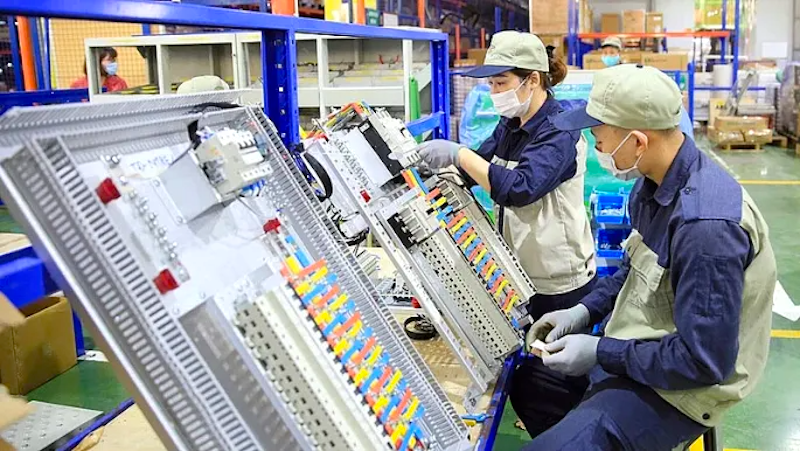Vietnam’s domestic market emerges as lifeline amid export slump
Domestic market has become vital for Vietnamese businesses amid global trade turbulence.
Dau Anh Tuan, Deputy Secretary General of the Vietnam Chamber of Commerce and Industry (VCCI), shared his insights on the opportunities and challenges that enterprises face when pivoting inward with the Vietnam Financial Times.
How potential is Vietnam’s domestic market?

Dau Anh Tuan, Deputy Secretary General of the Vietnam Chamber of Commerce and Industry. Photo: VGP
The domestic market of over 100 million people and growing middle- and upper-income segments has always been enticing for Vietnamese businesses. In the current context, it acts as a "lifeline" for many businesses, facilitating them in expanding export markets.
The domestic market becomes significant amid uncertain global trade, allowing local firms to stabilize their operations, maintain their revenues, navigate external risks while exploring international opportunities.
One of the biggest challenges is the risk of trade diversion. For instance, Chinese exporters can reroute their products through Vietnam before shipping to the US to avoid the US trade barriers, putting Vietnamese producers under more competitive pressure.
Furthermore, Vietnamese firms face increasing competition among local firms due to lifted tariff barriers from Vietnam’s numerous free trade agreements amid abundant foreign goods.
What helps boost business confidence this time?
Although there are many approaches to developing the domestic market, I believe a powerful solution lies in inspiring the younger generation of Vietnamese people to support locally made products.
We have seen how patriotic young people are, particularly during significant events such as the 50th anniversary of national reunification. Their passion for their country runs deep. The key question is whether we can translate that love for Vietnam into increased trust in and preference for Vietnamese goods.
We can see this in the entertainment sector. Recently, many foreign music shows have been held in Vietnam, attracting large audiences. For example, the concert Anh Trai Vuot Ngan Chong Gai (Brother Overcoming Thousands of Obstacles) has successfully held four to five performances with strong ticket sales.
This shows that, with the right presentation, Vietnamese audiences can embrace high-quality entertainment. Just as with music and entertainment, I firmly believe that Vietnamese goods can capture the hearts of local consumers if we leverage the national spirit and emotional connection.

Electronics production at the Quat Dong Industrial Cluster in Thuong Tin District, Hanoi. Photo: Dang Anh/The Hanoi Times
Vietnamese consumer products face intense competition from neighboring countries, particularly China. Without a fair and competitive environment, domestic enterprises will have a hard time thriving. It becomes necessary than ever to have a level playing field for Vietnamese businesses.
To improve the quality of Vietnamese goods, local firms must build their own brands and distribution networks. However, most major distribution chains in Vietnam are owned by foreign enterprises, making it difficult for Vietnamese products to reach consumers.
This is a major bottleneck requiring the government's instant action to assist businesses in accessing and expanding into domestic markets. I truly believe in robust support to help them unlock the full potential of the domestic market.
What should the government do to stimulate domestic consumption?
First and foremost, building consumer confidence is essential. This begins with maintaining macroeconomic stability, which gives people a sense of security about the economy’s future potential and growth prospects.
In addition, proactive measures are needed to stimulate demand. The government has made policies to untap the potential of the domestic market.
For example, we’ve seen demand-stimulating efforts, such as the extension of a 2% VAT reduction for one and a half years until the end of 2026. Additionally, the government has removed VAT on imported goods valued under VND1 million (US$38.5) and introduced measures to combat counterfeit and smuggled products.
Importantly, the government lifted visa requirements for several countries to promote tourism, a way to stimulate the services sector and boost domestic consumption. Meanwhile, the State Bank of Vietnam is lowering interest rates to encourage consumer spending and increasing public investment to spur economic growth and domestic demand.
These efforts demonstrate Vietnam’s commitment to maintaining and expanding its domestic market.
Given these policies, I’m optimistic that we will see stronger domestic demand and improved consumer purchasing power.
Thank you.








